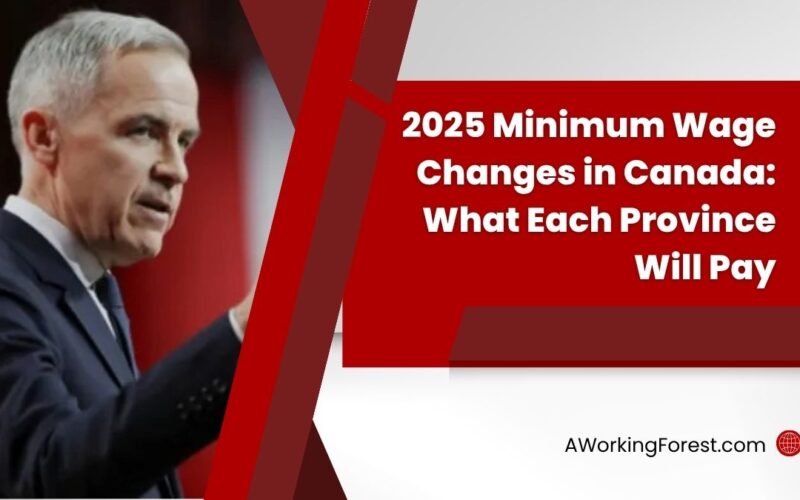As of 2025, Canada has implemented several adjustments to minimum wage rates across its provinces and territories. These changes aim to address the rising cost of living and ensure fair compensation for workers nationwide.
This article provides a comprehensive overview of the updated minimum wage rates effective in 2025.
Minimum Wage Rates by Province and Territory
| Province/Territory | Effective Date | Minimum Wage (CAD/hour) |
|---|---|---|
| Alberta | October 1, 2018 | $15.00 |
| British Columbia | June 1, 2025 | $17.85 |
| Manitoba | October 1, 2025 | $16.00 |
| New Brunswick | April 1, 2025 | $15.65 |
| Newfoundland & Labrador | April 1, 2025 | $16.00 |
| Northwest Territories | September 1, 2024 | $16.70 |
| Nova Scotia | October 1, 2025 | $16.50 |
| Nunavut | January 1, 2024 | $19.00 |
| Ontario | October 1, 2025 | $17.60 |
| Prince Edward Island | October 1, 2025 | $16.50 |
| Quebec | May 1, 2025 | $16.10 |
| Saskatchewan | October 1, 2024 | $15.00 |
| Yukon | April 1, 2025 | $17.94 |
| Federal (Canada-wide) | April 1, 2025 | $17.75 |
Provincial Highlights
Alberta
Alberta’s minimum wage remains at $15.00 per hour, unchanged since October 1, 2018.
British Columbia
Effective June 1, 2025, British Columbia increased its minimum wage to $17.85 per hour, reflecting adjustments based on the Consumer Price Index (CPI).
Manitoba
Manitoba’s minimum wage is set to rise to $16.00 per hour on October 1, 2025, up from the previous rate of $15.80.
New Brunswick
As of April 1, 2025, New Brunswick’s minimum wage stands at $15.65 per hour, with annual adjustments tied to the CPI.
Newfoundland & Labrador
Newfoundland & Labrador increased its minimum wage to $16.00 per hour on April 1, 2025, with future adjustments aligned with inflation rates.
Northwest Territories
The minimum wage in the Northwest Territories is $16.70 per hour, effective September 1, 2024, and is reviewed annually based on CPI and average hourly wage changes.
Nova Scotia
Nova Scotia’s minimum wage is set to increase to $16.50 per hour on October 1, 2025, following an earlier rise to $15.70 on April 1, 2025.
Nunavut
Nunavut maintains the highest minimum wage in Canada at $19.00 per hour, effective since January 1, 2024.
Ontario
Ontario’s minimum wage will increase to $17.60 per hour on October 1, 2025, up from $17.20, as part of its annual adjustment process.
Prince Edward Island
Prince Edward Island’s minimum wage is scheduled to rise to $16.50 per hour on October 1, 2025, with a further increase to $17.00 on April 1, 2026.
Quebec
Quebec’s minimum wage will increase to $16.10 per hour on May 1, 2025, from the previous rate of $15.75.
Saskatchewan
Saskatchewan’s minimum wage is $15.00 per hour, effective October 1, 2024, with annual reviews based on CPI.
Yukon
Yukon’s minimum wage increased to $17.94 per hour on April 1, 2025, with adjustments tied to the CPI for Whitehorse.
Federal Minimum Wage
For federally regulated sectors, the minimum wage increased to $17.75 per hour on April 1, 2025. If a province or territory has a higher minimum wage, the higher rate applies.
Factors Influencing Minimum Wage Adjustments
Several factors contribute to the adjustments in minimum wage rates across Canada:
- Cost of Living: Inflation and rising living expenses necessitate periodic wage reviews to ensure workers can meet basic needs.
- Consumer Price Index (CPI): Many provinces tie wage adjustments to the CPI to reflect economic changes accurately.
- Economic Growth: Stronger economies may support higher wages, aiming to reduce income inequality and poverty.
- Labor Market Conditions: Demand for labor and unemployment rates can influence wage policies.
Implications for Workers and Employers
Workers:
- Increased Earnings: Higher minimum wages can lead to improved living standards.
- Employment Opportunities: While higher wages benefit employees, they may also impact hiring practices.
Employers:
- Operational Costs: Businesses may experience increased labor costs, affecting pricing and staffing decisions.
- Compliance: Employers must stay informed about wage changes to ensure legal compliance and avoid penalties.
Frequently Asked Questions (FAQs)
1. How often are minimum wages reviewed in Canada?
Most provinces and territories review minimum wages annually, often adjusting rates based on the Consumer Price Index (CPI).
2. Does the federal minimum wage apply to all workers in Canada?
No, the federal minimum wage applies only to employees in federally regulated sectors. Workers in other sectors are subject to their province or territory’s minimum wage, which may be higher.
3. Are there different minimum wages for students or tipped employees?
Yes, some provinces have different minimum wage rates for students, liquor servers, or other specific groups. It’s essential to consult local labor standards for detailed information.
4. How can employers ensure compliance with new wage rates?
Employers should regularly consult official government resources and labor standards to stay updated on wage changes and ensure timely adjustments to payroll.
5. What should employees do if they’re paid below the minimum wage?
Employees should first address the issue with their employer. If unresolved, they can file a complaint with their province or territory’s labor standards office.
Staying informed about minimum wage changes is crucial for both employees and employers. Regularly consulting official resources ensures compliance and promotes fair labor practices across Canada.

